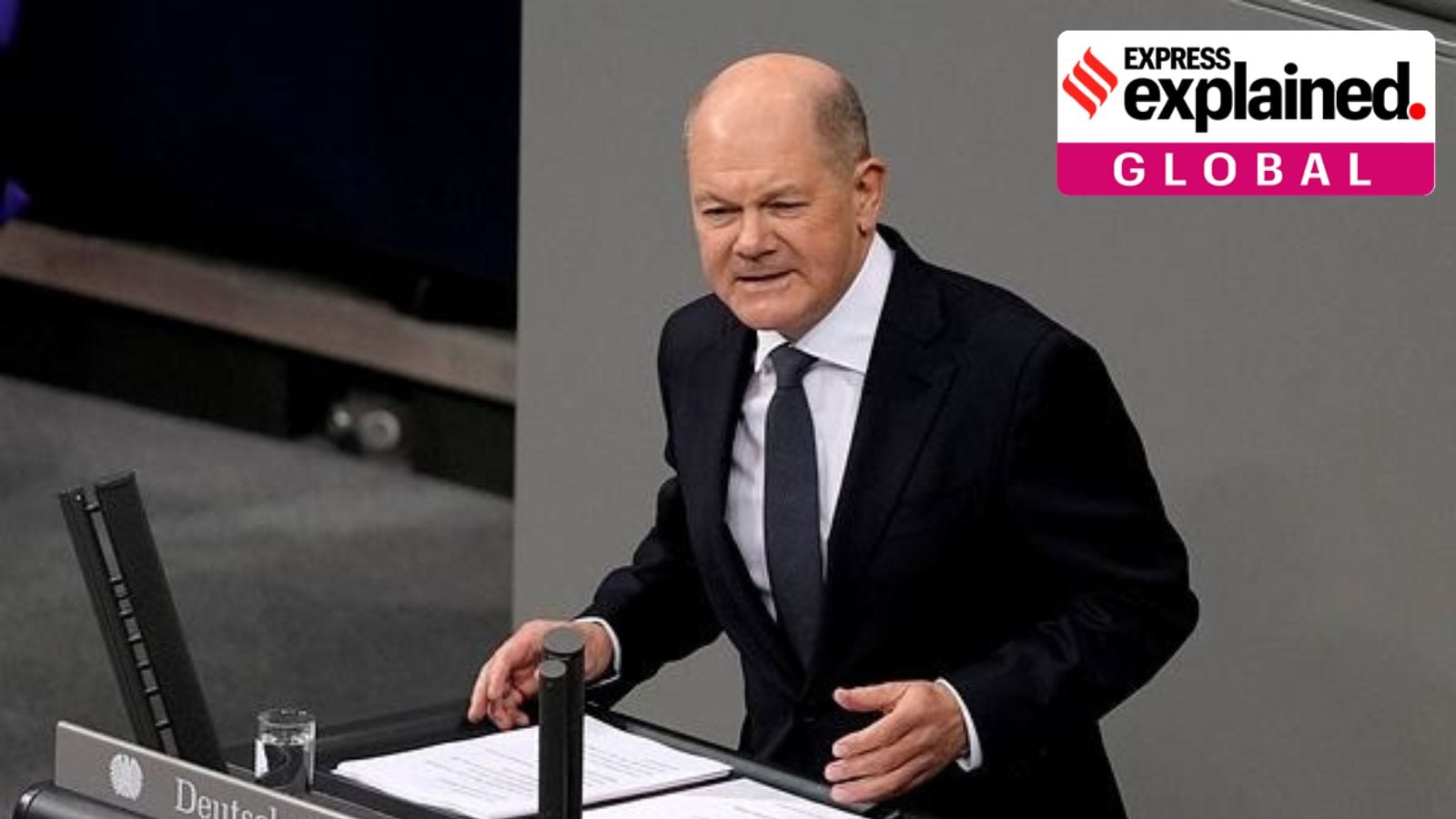Why German Chancellor Olaf Scholz faced a no-confidence vote
The confidence vote became necessary with the collapse of the ruling coalition in November, and a constitutional provision that prevents the Chancellor from dismissing the Bundestag outright. We explain.
 German Chancellor Olaf Scholz speaks during a plenary session at the German parliament Bundestag where he faces a vote of confidence, Berlin, Germany, Monday, Dec. 16, 2024. (Photo - AP/PTI)
German Chancellor Olaf Scholz speaks during a plenary session at the German parliament Bundestag where he faces a vote of confidence, Berlin, Germany, Monday, Dec. 16, 2024. (Photo - AP/PTI)A month after the collapse of the ruling coalition, German Chancellor Olaf Scholz faced a no-confidence vote in Parliament on Monday (December 16). His party, the Social Democratic Party (SPD) lost the vote as expected, which has paved the way for fresh elections in February.
Of the 717 votes, 394 voted against Scholz — he required 367 confidence votes to “win” the ballot.
President Frank-Walter Steinmeier is expected to dissolve parliament and allow a general election in the coming weeks.
In his last address to the Bundestag as Chancellor, Scholz had said “Politics is not a game,” alluding the blame to former partner Free Democratic Party (FDP) for the collapse of the tripartite coalition. He accused them of “sabotaging their own government” and “theatrics, which do not only damage the image of an individual government, but also of this democracy itself.”
What necessitated a confidence vote now?
The current political turmoil can be traced back to the formation of the coalition itself.
The 2021 parliamentary election yielded the SPD its best performance for the first time in two decades, securing 25.7% of the vote and emerging as the largest party for the first time since 2002. However, its coalition with the Greens, a fellow centre-left party, was not enough for an absolute majority.
Enter the FDP. The economically liberal party made inroads in the 2019 and 2021 elections, promising to balance the budget and adhere to the constitutionally enshrined debt brake. The FDP has advocated for minimal government interference except under exceptional circumstances. This put it at ideological odds with both the SPD and the Greens, which have advocated for a stronger state presence and spending on social policy as well as climate protection.
After ruling out the possibility of a grand coalition with the CDU/CSU, the road was paved for a ‘traffic light coalition’ with the FDP, named so after the traditional colours of the respective parties.
Political infighting was rife within 100 days of its term, with the FDP opposing its partners on legislative issues such as renewable energy, upholding the contentious debt brake policy and modifying immigration laws.
The regional elections to Thuringia and Saxony this September also presented an unprecedented setback to the trio, with all three performing poorly. Instead, the far-right Alternative for Democracy (AfD) made significant electoral gains, marking the first time a right-wing party had triumphed in Germany post-World War.
The collapse of this fractious coalition was sealed when Scholz fired the finance minister, Christian Lindner of the FDP on November 6. This was followed by the exit of Lindner’s pro-business FDP, leaving the ruling coalition without a parliamentary majority.
Under what circumstances is a confidence vote held?
Article 68 of the German constitution authorises the President to dissolve the Bundestag (German parliament) within 21 days if “a motion of the Federal Chancellor for a vote of confidence is not supported by the majority of the Members of the Bundestag”. Additionally, this right of dissolution shall lapse once the Bundestag elects another Chancellor.
The provision was made in the constitution post World War II to prevent a situation of political instability akin to what followed with the collapse of the Weimar Republic in the 1920s-30s. This would ensure the Chancellor cannot unilaterally dissolve the Bundestag on their own.
In the past, the confidence vote has been used five times to dissolve parliament and call for early polls. Most recently, former SPD Chancellor Gerhard Schröder triggered Germany’s third election in 2005 after calling for a confidence vote. His party narrowly lost the election to a coalition of the Christian Democratic Union (CDU) and Christian Social Union in Bavaria (CSU), and Angela Merkel succeeded him as Chancellor.
What comes next for Germany?
If Scholz loses the no-confidence vote, the country will likely go to the polls on February 23, seven months before originally slated.
The CDU/CSU is currently the frontrunner to win a majority but seems unlikely to form a government without allying itself with the SPD or the Greens.
In such a case, party leader Friedrich Merz, currently tipped to be the next Chancellor, would face the unsavoury challenge of reining in the stagnating economy and tackling the threat of tariffs from the US. Among other issues of contention have been the question of sending increased aid to Ukraine, and addressing growing concerns on immigration, which the AfD has banked upon.
- 01
- 02
- 03
- 04
- 05






































